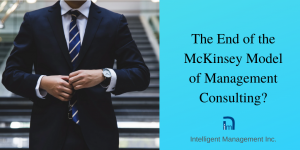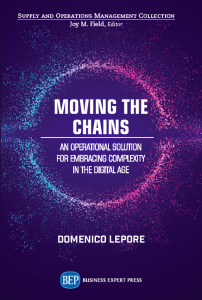
A new book is asking why young people who arrive at college and want to change the world end up working for Goldman Sachs and McKinsey. ‘Winners Take All: The Elite Charade of Changing the World’ by Anand Giridharadas explores how “the global elite’s efforts to “change the world” preserve the status quo and obscure their role in causing the problems they later seek to solve.”
This makes depressing reading, especially when we hear from companies we encounter who have hired the likes of McKinsey for top dollars and received “solutions” that have not resolved the issues they sought to fix (but came with a glossy report and recommendations). There is clearly something wrong with this model of management consulting.
Giridharadas’ book includes the experience of an ambitious and well-meaning graduate at McKinsey that is revealing:
“Very rarely, if ever, did the step-by-step, perfectly linear process of ‘here’s how we’re going to conduct this exploration’ — very rarely did that actually surface the right answer,” she said. Often, that process — the thing for which McKinsey was famed — was “used primarily for communicating the answer, rather than generating it,” she said. The answers were derived through intelligence and common sense, and then the team would make them look more like trademark McKinsey answers: “We would backfill them into the template,” Cohen said.
We have written already about the dangers of linear thinking in a complex world. This does not prevent the McKinseys of the world from continuing to propose their outdated approach – because they can.
Management Consulting has gained a bad reputation because of the cynical mode of operating that certain firms have. This was amusingly illustrated in the TV series ‘House of Lies’ about management consultant star Marty Kaan (played by the excellent Don Cheadle) and his super ambitious colleagues. Everything is excessive, from the crude language to the elaborate acts of dog-eat-dog aggression.
This is certainly not reality for the many consultants making an honest living through earnest efforts to improve the performance of their clients’ companies. Beyond the outrageous and often Machiavellian behavior in ‘House of Lies’, what is it about this management consulting model that is so flawed?
Imposing the model
The old school approach imposes a model on clients. In ‘House of Lies’, Marty Kaan’s goal is to “open their wallets not their minds”. He has a recipe that has had success in the past in certain situations. He is able to persuade clients to spend a lot of money to buy into that success. He has an army of “hungry MBAs” crunching numbers. These numbers can indeed provide data that can be useful. However, this is far from being a full solution.
A Better Way: Harnessing the knowledge of the client
There is a much more powerful way to help companies solve their problems that is appropriate for the age of complexity where linear thinking is not only outdated, it is damaging.
The truth is that in every organization there is already a wealth of knowledge. An organization does not need a consultant to bring in a solution. They need to be guided to create their own solution from what they already know. It is a fact that no system can change itself. Often the leaders of an organization get stuck because they are blinded by their own mental models, even their own success, and need outside help to see what exactly needs to be changed and how to methodically implement that change. Some new elements of knowledge are certainly useful but a ready-made model is not the answer.
What can bring true value, as we have seen in over 20 years of working with the Decalogue Methodology in companies in many sectors, is to provide an organization with a framework for positive change. That framework should be based on profound knowledge of how organizations function at their deepest, systemic level and an understanding of variation and synchronization. The goal is to guide people to create new synaptic connections to generate new solutions from the knowledge they already have. This provides a whole new, systemic perspective; it opens minds and allows organizations to develop their own ability to generate solutions going forward.
Beyond the comfort zone
It can happen that when an organization moves forward on a path of positive change, the leaders of that organization move into a new zone that is unfamiliar and therefore beyond their comfort zone. This is where it is crucial to have a strong relationship of trust with the consultants who are enabling the change to happen. This trust can only exist when the consultants bring profound knowledge of their own subject matter and a genuine desire to make positive change.
Bringing true value
Marty Kaan and Associates reflect a management consulting mindset based on greed and ambition (both theirs and the client’s) where the consultants hunt their kill and where if somebody wins then somebody else always loses. We now live in a world where we need to develop systemic intelligence, not cunning, so we can navigate complexity, and this involves relationships built on collaboration, cooperation and trust. When consultants have that knowledge, then they can bring the true value of applying that knowledge in partnership with their clients.
There are no short cuts, no tips or tricks, no ready-made formats. There is only deep study, meticulous implementation and the satisfaction of a relationship where everybody can win. That’s probably not the subject-matter of prime time TV drama but it could well be the vocation that young, idealistic people wanting to change the world for the better are seeking.
SCHEDULE AN INTRODUCTORY CALL WITH US ‘






Leave a Reply